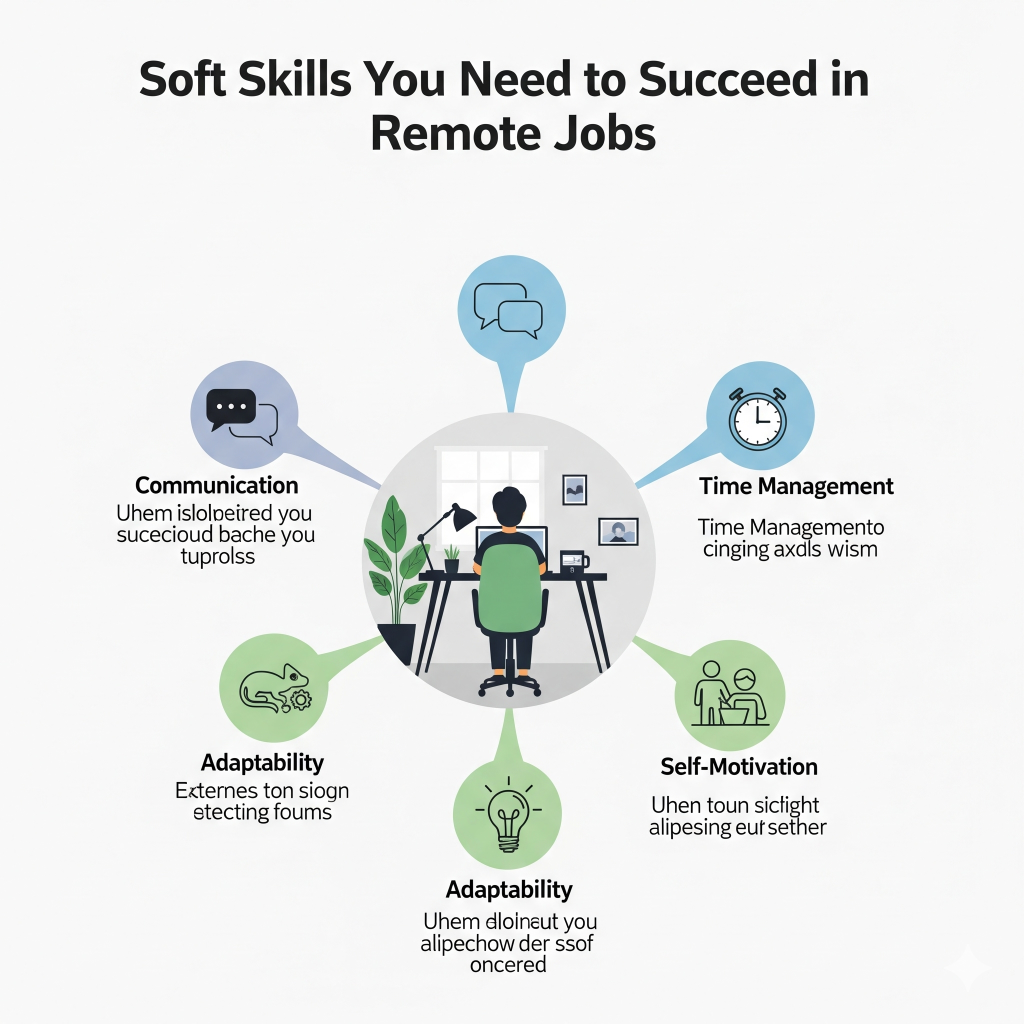Introduction
With the rise of remote work, professionals from all industries are navigating new ways of collaborating, communicating, and managing their tasks. While technical skills are important, what truly sets successful remote workers apart are their remote job soft the personal attributes and interpersonal abilities that help them adapt, problem-solve, and remain productive outside a traditional office setting.
Remote work environments present their own set of challenges, including working independently, maintaining communication across time zones, staying disciplined without direct supervision, and resolving conflicts in virtual spaces. Employers increasingly value candidates who bring not only technical expertise but also strong soft skills that enhance teamwork, productivity, and resilience.
In this guide, we’ll explore the most important remote job soft skills you need to build a successful career, how to develop them, and how they can help you thrive in a digital-first work culture.
You can read the summary of this article here.
Why Remote Job Soft Skills Are Essential for Success
Remote jobs require individuals to be more self-reliant, adaptable, and emotionally intelligent than ever before. In the absence of face-to-face supervision, remote workers are expected to manage their time efficiently, communicate clearly, and handle unforeseen challenges with minimal guidance.
Soft skills in remote jobs help you build trust with clients and teammates, maintain motivation, and avoid misunderstandings. For example, someone with excellent communication skills can effectively coordinate across different time zones, while a worker with strong problem-solving abilities can quickly troubleshoot technical issues.
These soft skills don’t just enhance day-to-day tasks; they also shape your professional reputation and long-term career prospects. Remote employers want individuals who can be proactive, empathetic, and organized, even when working independently.
Top Remote Job Soft Skills Every Professional Should Master
Communication Skills for Remote Jobs and Virtual Teams
Effective communication is the backbone of remote work. Unlike in-person environments, virtual teams rely heavily on emails, video calls, and messaging platforms. Clear, concise, and empathetic communication prevents misunderstandings and fosters collaboration.
In remote jobs, communication involves more than just sharing information—it’s about being attentive to tone, ensuring clarity in written communication, and confirming understanding regularly. Active listening during virtual meetings and providing structured feedback also play a vital role in maintaining strong working relationships.
Time Management and Self-Discipline for Remote Job Success
Without the structure of a traditional office, time management becomes a critical soft skill. Remote workers need to create their own schedules, prioritize tasks, and meet deadlines while avoiding distractions at home.
Self-discipline helps you stay motivated even when there is no direct oversight. It allows you to plan your day, allocate time for work and rest, and maintain productivity over the long haul. Using productivity tools like digital calendars or task trackers can further support your ability to stay organized.
Problem-Solving Skills in Remote Work Environments
Remote work often involves technical glitches, communication gaps, or shifting priorities. Workers with strong problem-solving skills can navigate these challenges calmly and effectively.
Problem-solving in a remote setting requires creativity, patience, and a proactive mindset. Rather than waiting for instructions, successful remote employees analyze the issue, explore solutions, and communicate with stakeholders to ensure tasks are completed on time.
Emotional Intelligence and Adaptability for Remote Job Challenges
Emotional intelligence helps remote workers manage stress, navigate workplace dynamics, and build empathy with colleagues from diverse cultural backgrounds. Being emotionally aware helps you respond thoughtfully rather than react impulsively to challenging situations.
Adaptability is equally important. Remote work environments can shift rapidly due to changes in technology, client expectations, or project requirements. Being flexible and open to learning ensures you stay resilient during periods of change.
Collaboration and Networking Skills for Remote Job Growth
While remote work emphasizes independence, collaboration remains essential for achieving team goals. Remote job soft skills like collaboration help you contribute meaningfully to group projects, share ideas, and offer support when needed.
Networking in remote jobs involves engaging with coworkers, joining professional groups, and participating in online forums. Strong networking skills not only enhance career opportunities but also provide a sense of belonging in virtual workspaces.

How Seniors and Retired Professionals Can Stay Productive While Working Remotely
Developing soft skills for remote jobs doesn’t happen overnight it takes intention, practice, and self-awareness. Here’s how you can strengthen these abilities for long-term success.
Creating Work Routines for Remote Jobs in Retirement
A structured daily routine supports both productivity and mental well-being. Start by setting clear working hours, creating dedicated workspaces, and using tools like planners or apps to track assignments.
Consistency helps build self-discipline, while breaks throughout the day prevent burnout. Balance your schedule by incorporating exercise, hobbies, and downtime to recharge your mind and body.
Tech Tools Seniors Can Use for Remote Work
Many seniors may feel hesitant about digital platforms, but numerous user-friendly tools make remote work accessible for all.
Platforms like Slack, Zoom, and Google Meet facilitate communication, while apps like Trello and Asana help organize tasks visually. Tutorials and community groups can guide seniors as they learn new software, making the transition smoother and less intimidating.
Balancing Health and Wellness in Remote Jobs
Physical health impacts focus, energy, and motivation. Incorporate gentle exercises such as stretching, yoga, or walking into your routine to maintain mobility and prevent strain.
Mental wellness is equally important. Regular mindfulness practices, journaling, or connecting with friends and family can help manage stress and foster emotional balance.
Communication and Boundaries in Remote Jobs for Seniors
Setting boundaries is vital to avoid feeling overwhelmed. Be transparent with clients about your working hours and availability. Learning to say “no” to extra tasks ensures that your workload remains manageable.
Additionally, practicing clear communication helps reduce anxiety and build trust with colleagues. Regular check-ins, written summaries, and confirmations ensure that expectations are aligned and deadlines are met.
Overcoming Common Challenges by Strengthening Remote Job Soft Skills
Remote jobs may present challenges such as loneliness, distractions, or adapting to new tools. Strengthening soft skills allows you to face these obstacles confidently.
Building resilience through problem-solving exercises, enhancing communication to foster stronger connections, and learning to manage your time effectively are all part of overcoming these hurdles.
Online communities and support networks also offer spaces where you can share experiences, exchange advice, and learn new strategies from others in similar situations.
Best Job Tools to Find Remote Jobs and Improve Remote Job Soft Skills
Using the right platforms not only helps you find remote work but also supports your skill development. Here are a few trusted tools that assist in communication, organization, and learning:
- Upwork and Fiverr – Freelance platforms offering flexible opportunities across industries
- LinkedIn – A networking hub to connect with professionals and find remote roles
- Zoom and Google Meet – Video conferencing tools that enhance virtual communication
- Trello and Asana – Task management tools that help structure projects and deadlines
- Grammarly – A writing assistant for improving clarity and tone in emails or reports
- Canva – A design tool for creating professional presentations or content
- Coursera and Udemy – Online learning platforms offering courses on communication, leadership, and time management
These tools help you practice and refine your remote job soft skills while ensuring you remain productive and efficient.
Conclusion – Building Strong Remote Job Soft Skills for Long-Term Success
Remote work offers flexibility, independence, and the opportunity to grow professionally from anywhere in the world. However, success in virtual environments depends not only on technical expertise but also on the strength of your remote job soft skills.
By cultivating communication, time management, problem-solving, adaptability, and collaboration, you can navigate challenges confidently and build meaningful relationships with colleagues and clients alike. Whether you’re a seasoned professional or new to remote work, these skills empower you to thrive in a digital-first world.Take the time to invest in your soft skills, practice regularly, and use available tools to support your growth. With the right mindset and effort, you’ll not only excel in your current role but also open doors to new opportunities, fulfilling experiences, and a more balanced work-life harmony.Start today strengthen your remote job soft skills and embrace the freedom, flexibility, and fulfillment that remote work offers.
If you’re ready to start this journey, explore platforms like Best Job Tool , which offers verified remote opportunities tailored to students’ needs. By planning wisely and setting realistic goals, you can make the most of your study abroad experience learning, exploring, and earning along the way.



